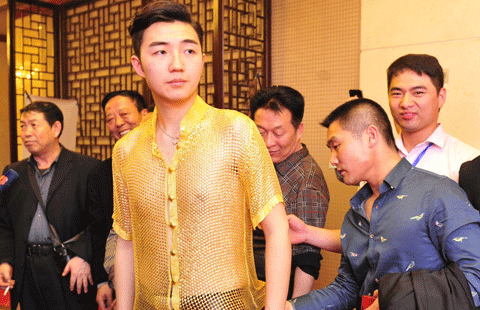US 'miscalculated' on AIIB: Albright
Updated: 2015-04-01 13:43
By By DONG LESHUO in Washington and LIA ZHU in San Francisco(China Daily USA)
|
||||||||
Stephanie Xu, president of US-Asia Innovation Gateway, a non-profit corporation based in Silicon Valley, said: "We are happy to see the US' welcoming attitude toward the new bank."
"The AIIB is aimed at promoting innovation and developing infrastructure projects in Asia, which will create more job opportunities and economic growth of the developing countries," she said. "The progress of innovation and financial exchanges is unstoppable."
He Fan, senior research fellow at the Institute of World Economics and Politics at the Chinese Academy of Social Sciences, said: "The best thing about AIIB is not about providing funds, but establishing a platform to find more investment opportunities. This is definitely a plus to the global economy."
When asked if the two countries would be "strategic partners" or "strategic competitors", Albright said "such labels are so dependent on particular circumstances, that they can often be more misleading than helpful".
"Terms like 'competitors' emphasize a zero-sum view of US China-relations, which I think is not productive," she said. "The truth is our relationship is warmer, deeper and more productive than anyone could predict a quarter of a century ago.
"We've made amazing progress and at the same time our governments, businesses and civil society organizations still have moments of … disagreement," she said. "There is no doubt we are in one of those moments right now."
Albright said that she expects mutual national interests "will be the Obama administration's focus when President Xi visits Washington this fall".
Lew also said that Americans have benefited from China's contributions to bilateral economic development, and that the US welcomes China having a significant role in global economics.
He said that the US-China Strategic and Economic Dialogue and other high-level engagements have produced "real results", as China has been making efforts to increase imports from the US, appreciate the yuan and commit itself to a Bilateral Investment Treaty.
"Since early 2009, US exports of goods to China have roughly doubled, growing much faster than our exports to the rest of the world," Lew said. "Last year, the United States exported around $166 billion in goods and services to China."
He also noted China's commitment to enhancing the transparency of reserve data, such as the adoption of the International Monetary Fund standards for data reporting.
Another result brought by the two countries' high-level engagement is a bilateral agreement on expanding the Information Technology Agreement and the negotiation of the BIT, Lew said.
Under the BIT, US firms "would be treated like Chinese firms and given non-discriminatory market access, subject only to a specified list of exceptions", he said.
"China's commitment to negotiate on the premise of non-discrimination, fairness, openness and transparency offers a substantial opportunity to promote investment, and if achieved, will help level the playing field for American businesses to invest and compete in China," the treasury secretary said.
He also said the list of exceptions, or "negative list," should be "short, limited in scope and narrowly defined."
Contact the writers at leshuodong@chinadailyusa.com and liazhu@chinadailyusa.com.

 2015 New York International Automobile Show kicks off
2015 New York International Automobile Show kicks off
 Ancient 'Xiangshi' kicks off in Wuzhen
Ancient 'Xiangshi' kicks off in Wuzhen
 Golden moments at jewelry show
Golden moments at jewelry show
 Luoyang, the ancient capital of thirteen dynasties
Luoyang, the ancient capital of thirteen dynasties
 Across America over the week (from March 27 to April 2)
Across America over the week (from March 27 to April 2)
 Off the beaten path: China's top 'surf' breaks
Off the beaten path: China's top 'surf' breaks
 Where eagles still soar
Where eagles still soar
 Top 5 cooperation priorities in the Belt and Road Initiative
Top 5 cooperation priorities in the Belt and Road Initiative
Most Viewed
Editor's Picks

|

|

|

|

|

|
Today's Top News
Xi plants roots of
green awareness
Li backs firms' global vision
China to standardize energy conservation by 2020
More Chinese, US pilots killed in anti-Japanese invasion war identified
China checkmates US on Asia bank
Policy helps China to urbanize
Curbing 'brushing' difficult: report
Conflict not inevitable: Joseph Nye
US Weekly

|

|






